It was on the night of Nov. 9-10, 1938, when members of the Nazi party sponsored anti-Jewish riots (pogroms) which attacked Jewish persons and destroyed Jewish owned property in Germany and Austria. Known as “Kristallnacht, the Night of Broken Glass,” this event is regarded by historians as “the Night the Holocaust began” in Europe, which ultimately led to the murder of more than six million Jews.
To remember those events and to stand united in saying “Always Remember!” “Never Forget!” and “Never Again!” the Catholic-Jewish Dialogue of Collier County (CJD) hosted its 21st annual “Kristallnacht: The Night of Broken Glass” on Nov. 17, 2024, at St. John the Evangelist Parish in Naples. The event was co-sponsored by the Diocese of Venice and Jewish Federation of Greater Naples, GenShoah of SWFL, and the Holocaust Museum and Janet G. and Harvey D. Cohen Education Center.
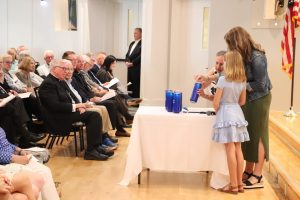
On behalf of the Diocese, Bishop Frank J. Dewane said the Catholic-Jewish Dialogue has really demonstrated a forward-looking vision, forming an ongoing relationship despite what is found in our own society.
“We cannot let the differences between us threaten the depth of the bond that is religious, theological, spiritual, and personal in many ways,” Bishop Dewane said. “We the people of our respective faiths have travelled the long and winding road in terms of history. The shared history has seen some dark days and many bright days. We are, and must continue to be, men and women of dialogue.”
The featured speaker was John Koenigsberg, who shared his Holocaust survival story. Koenigsberg was 5 when the Gestapo took away his grandfather and forced his family into hiding in occupied Holland. He would spend the next two years in the care of a Catholic family who took him in, while the fate of his parents remained unknown to him.
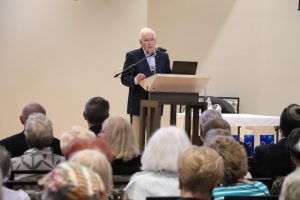 Koenigsberg was nearly eight when Allied forces liberated the Netherlands in 1945 and he later reunited with his parents, but he never saw his grandfather and many other family members again. During those two years in hiding, his home was a small cottage in a Nazi-controlled village in southern Holland, hidden away by the Snijckers, a sympathetic couple with four children of their own.
Koenigsberg was nearly eight when Allied forces liberated the Netherlands in 1945 and he later reunited with his parents, but he never saw his grandfather and many other family members again. During those two years in hiding, his home was a small cottage in a Nazi-controlled village in southern Holland, hidden away by the Snijckers, a sympathetic couple with four children of their own.
“I am one of the very, very fortunate ones,” Koenigsberg said. “Only seven percent of children under the age of 16 survived the Holocaust. By recent estimates, there are probably less than 75,000 fellow survivors left in the world.”
Following a lengthy application process, the national Holocaust memorial in Israel granted the “Righteous Among the Nations” honors to the Snijckers and added their names to the Wall of Honor in the Garden of the Righteous in Jerusalem in 2009. This is the highest honor Yad Vashem bestows upon non-Jews who risked their lives to come to the aid of the Jewish people during the Holocaust.
“If it was not for the bravery of Mom and Pop Snijckers – I, my children, grandchildren and generations of descendants in the future would not exist,” Koenigsberg said. “The reason I speak about my experiences and relive these memories is because I believe the lessons of the Holocaust should not become a footnote in history. We must educate younger generations and imbue them with a spirit of remembrance as well as the mission to combat all forms of racial, religious and ethnic hatred before it’s too late.”
A poignant moment during the annual commemoration was a candle lighting ceremony. Six candles were lit by Gen Shoah (first- second- and third-generation Holocaust survivors). Each lit their candle for the victims of the Holocaust and for a brighter future. A seventh candle was lit for the victims of the Oct. 7, 2023 terror attacks in Israel and included a call for the return of 95 remaining hostages.
The CJD is affiliated with Jewish Federation of Greater Naples and the Collier County Parishes of the Diocese of Venice. Its purpose is to engage Catholics and Jews in understanding history and advancing the cause of mutual understanding and appreciation of differences as well as commonalities.






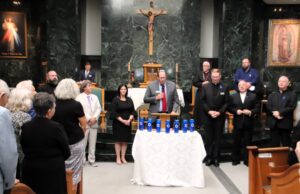
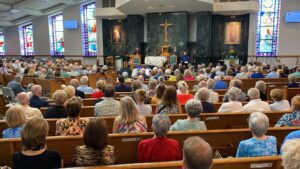
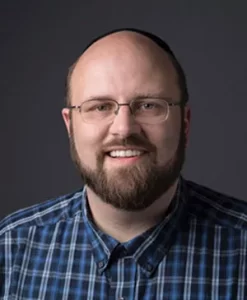 Kristallnacht recounts the attacks on Jewish communities throughout Germany on Nov. 9-10, 1938. The Kristallnacht commemorative event memorializes the six million Jews and millions of others who were exterminated during the Holocaust.
Kristallnacht recounts the attacks on Jewish communities throughout Germany on Nov. 9-10, 1938. The Kristallnacht commemorative event memorializes the six million Jews and millions of others who were exterminated during the Holocaust.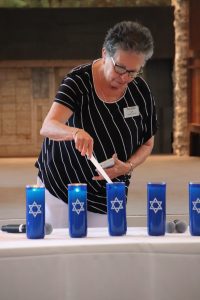 To remember those events, the Catholic-Jewish Dialogue of Collier County hosted its annual “Kristallnacht: The Night of Broken Glass” Nov. 5, 2022, at Temple Shalom in Naples. The event was co-sponsored by the Diocese of Venice and Jewish Federation of Greater Naples, GenShoah of SWFL, and the Holocaust Museum and Janet G. and Harvey D. Cohen Education Center.
To remember those events, the Catholic-Jewish Dialogue of Collier County hosted its annual “Kristallnacht: The Night of Broken Glass” Nov. 5, 2022, at Temple Shalom in Naples. The event was co-sponsored by the Diocese of Venice and Jewish Federation of Greater Naples, GenShoah of SWFL, and the Holocaust Museum and Janet G. and Harvey D. Cohen Education Center.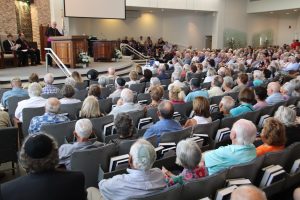 “Each one of us has a responsibility to take action when we see anti-Semitism,” Bishop Dewane continued. “It isn’t just for the Dialogue group to resolve. It isn’t just for a Parish or synagogue. It’s for all of us to come together when we see the negativity that can rears its head, just as it did so many years ago when Kristallnacht foreshadowed what the world never thought could happen (the Holocaust) – and it did happen. You and I have responsibilities to speak out and to speak up.”
“Each one of us has a responsibility to take action when we see anti-Semitism,” Bishop Dewane continued. “It isn’t just for the Dialogue group to resolve. It isn’t just for a Parish or synagogue. It’s for all of us to come together when we see the negativity that can rears its head, just as it did so many years ago when Kristallnacht foreshadowed what the world never thought could happen (the Holocaust) – and it did happen. You and I have responsibilities to speak out and to speak up.”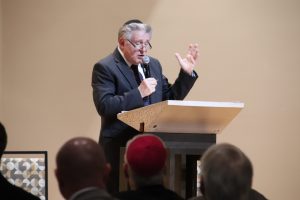 Rabbi Abraham Skorka and Pope Francis have served as examples of friendship and interreligious dialogue because they have lived out the call of Nostrae Aetate which acknowledges the Church’s bond with the Jewish people.
Rabbi Abraham Skorka and Pope Francis have served as examples of friendship and interreligious dialogue because they have lived out the call of Nostrae Aetate which acknowledges the Church’s bond with the Jewish people.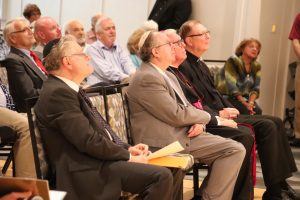 Bishop Frank J. Dewane also addressed the Catholic-Jewish Dialogue gathering, talking about the noble mission of the group.
Bishop Frank J. Dewane also addressed the Catholic-Jewish Dialogue gathering, talking about the noble mission of the group.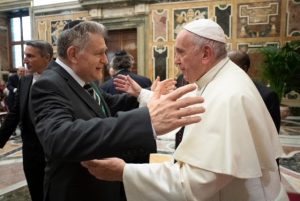 All are invited to attend the program which is co-sponsored by the Diocese of Venice and Jewish Federation of Greater Naples. The presentation will take place at 3 p.m. Sunday, April 3, 2022, in the ballroom of St. John the Evangelist Parish, 625 111th Ave. N., Naples. Doors open at 2:30 p.m.
All are invited to attend the program which is co-sponsored by the Diocese of Venice and Jewish Federation of Greater Naples. The presentation will take place at 3 p.m. Sunday, April 3, 2022, in the ballroom of St. John the Evangelist Parish, 625 111th Ave. N., Naples. Doors open at 2:30 p.m.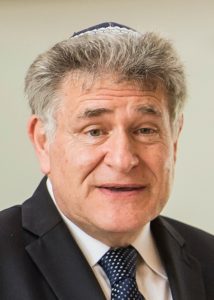 “His message to my synagogue in 2004 went on to develop the idea of the encounter between the individual and God, and of the importance of memory in that relationship. He alluded to the essence of Jewish belief expressed during this most holy season, the Days of Awe: to believe in the Creator who relates to each person and remembers each individual. In fact, I was astonished to hear this sermon. (His) message on this occasion could well have been the reflections of a Rabbi to his community.”
“His message to my synagogue in 2004 went on to develop the idea of the encounter between the individual and God, and of the importance of memory in that relationship. He alluded to the essence of Jewish belief expressed during this most holy season, the Days of Awe: to believe in the Creator who relates to each person and remembers each individual. In fact, I was astonished to hear this sermon. (His) message on this occasion could well have been the reflections of a Rabbi to his community.”